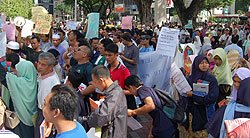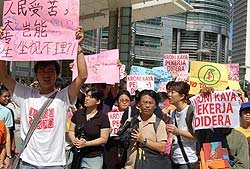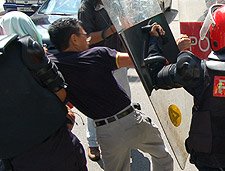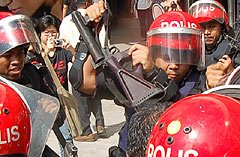May 28, 06 2:09pm (Malaysiakini Report)

It was supposed to be the climax of a series of anti-fuel hike demonstrations, yet it ended on a tragic note when police today forcefully broke up the protest with at least two seriously injured.
At 10.30am, the 500-strong crowd gathered near the Jalan Ampang entrance of the iconic Kuala Lumpur City Centre and began their peaceful protest with noisy chants and fiery speeches.
One of the protest banners said: "Cronies get rich while workers are oppressed".

The protestors also slammed a government's decision last week to raise electricity tariffs by 12 percent - the first hike in nearly a decade.
Some 100 riot police wielding batons and rifles stood guard in front of KLCC Twin Towers, alongside several water cannon trucks, as helicopters flew overhead.
"Everybody is suffering from the fuel hike. Now electricity prices are also up. These two hikes will hit us hard, whether our pay is large or small," chief protest organiser Dr Hatta Ramli told the crowd.
Things took a turn for the worse when the third speaker at the demonstration, DAP representative Ronnie Liu, expressed his gratitude for the support given by voters to the opposition at the recent Sarawak state elections.
Immediately, the police through loudhailers issued an order for the crowd to disperse. The
 crowd ignored the warning, and five minutes later, water cannons were fired.
crowd ignored the warning, and five minutes later, water cannons were fired.Despite being drenched profusely, most of the crowd defiantly held their ground, prompting plainclothes police officers to move in and make random arrests.
Those arrested include Liu, PAS Kubang Kerian member of parliament Salahuddin Ayub and Parti Keadilan Rakyat deputy information chief Badrul Hisham.
As the crowd moved out of the water cannons' range, the Federal Reserve Unit (FRU) charged at them sending many protestors, including women and children, running for cover as shocked Sunday shoppers looked on.
Excessive violence
 Eyewitness reports tell of excessive violence being used by the FRU on several protestors, including PKR deputy secretary-general Zahir Hassan (left and below), who was kicked a number of times while sprawled on the road.
Eyewitness reports tell of excessive violence being used by the FRU on several protestors, including PKR deputy secretary-general Zahir Hassan (left and below), who was kicked a number of times while sprawled on the road.Zahir was walking away from the protest venue with his two daughters when he was repeatedly shoved from behind by a FRU officer using his shield.

The FRU officer then turned to Zahir’s two daughters, both in their 20s, pushing one of them. Enraged, Zahir attempted to protect his daughters from the police officer.
Instead, Zahir was assaulted by several FRU personnel. He was thrown to the floor, endured several blows of police baton and at least three kicks - two on the back and one on the abdomen - prompting his daughters to scream hysterically.
All this while, Zahir was clutching onto the anti-fuel hike booklet that was distributed at the protest. According to PKR information chief Tian Chua, Zahir - who was arrested by the police - had been sent to the hospital for medical attention.
An X-ray was taken before Zahir was sent to the Pudu police station where other detainees were held.
In another altercation, one protestor was subdued by at least 10 FRU personnel.
 The protester held on to a police officer in a bid to shield himself from the blows, which included one from the butt end of a gas canister launcher (second photo from top).
The protester held on to a police officer in a bid to shield himself from the blows, which included one from the butt end of a gas canister launcher (second photo from top).Traces of blood stains were also found at the entrance of KLCC, where a scuffle between FRU personnel and an unidentified protestor had allegedly taken place. The protestor was believed to have been hospitalised for lacerations to the head.
Cops act in self-defence
Dang Wangi OCPD ACP Kamal Pasha (right) told reporters after the police wrapped up their operations at about 11.30am, that 18 individuals were arrested, including two women.
Asked by malaysiakini if the use of force, especially the repeated kicking by his men, were justifiable, Kamal told reporters that his men had acted in self-defence.
"They (the protestors) resisted arrest. They started kicking first. (Retaliation) for us is self-defence. Minimum force was used," insisted Kamal.

After the FRU and the bulk of the police had left the scene, some remaining 300 protestors regroup for a short address by PAS central committee member and chief protest organiser Hatta.
He told the crowd that past protests had been peaceful and this protest was to be the last before they begin a new phase of their anti-fuel hike campaign.
When he asked the crowd if they should continue street protests in reaction to today's violent response from the police, he was met with boisterous shouts of agreement.
A crowd later gathered outside the Pudu police station where the detained protestors were held. At about 4pm, all 18 were freed on police bail.
The protestors said that they might go the Human Rights Commission, or Suhakam, tomorrow to lodge a complaint against the police.





No comments:
Post a Comment